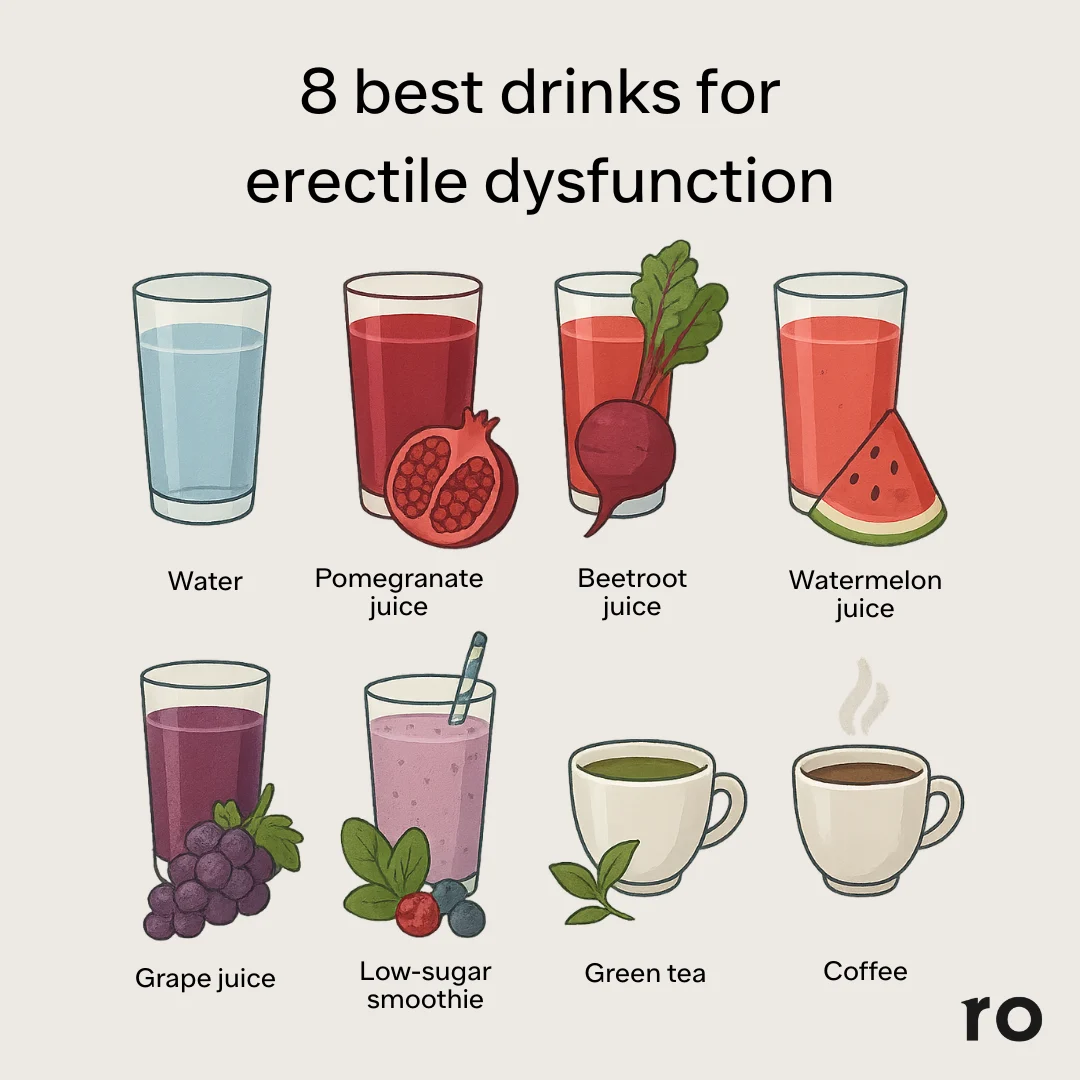Key takeaways
No single beverage can fix erectile dysfunction on its own. But natural drinks like water, some fruit juices, smoothies, green tea, and coffee have nutrients that might help support healthy blood flow.
Healthy habits are key. Regular exercise, managing stress, getting good sleep, and avoiding smoking or drinking too much alcohol can all help improve erections naturally.
If needed, prescription drugs (such as Viagra and Cialis) are proven to work well. In more serious cases, treatments like penile injections or implants might also help.
Here's what we'll cover
Here's what we'll cover
Here's what we'll cover
Key takeaways
No single beverage can fix erectile dysfunction on its own. But natural drinks like water, some fruit juices, smoothies, green tea, and coffee have nutrients that might help support healthy blood flow.
Healthy habits are key. Regular exercise, managing stress, getting good sleep, and avoiding smoking or drinking too much alcohol can all help improve erections naturally.
If needed, prescription drugs (such as Viagra and Cialis) are proven to work well. In more serious cases, treatments like penile injections or implants might also help.
It’d be nice if there were a magic beverage — something out of a Disney movie — that could instantly fix erectile dysfunction (ED). One sip and, voila, stronger, longer-lasting erections. While, unfortunately, such an enchanted potion doesn’t exist, what you pour into your glass can make a difference down there. Enter: the best drinks for erectile dysfunction.
Research suggests that drinks like beetroot juice, pomegranate juice, and even (oh-so-simple) water may help support blood flow, lower inflammation, or boost nitric oxide levels — all key factors in getting and maintaining an erection. But they’re unlikely to be as effective as medications, such as Viagra (sildenafil).
“There is no scientific evidence that a single beverage can reverse ED on its own,” says Justin Houman, MD, FACS, an assistant professor of urology at Cedars-Sinai Medical Center. “While certain drinks may improve cardiovascular health or reduce inflammation — both of which support erectile function — they are supportive at best.”
However, certain drinks may still be worth considering as part of an overall healthy lifestyle. Ahead, we break down the best drinks for erectile dysfunction, according to urologists and science.
What can I drink to get hard?
While some drinks might help support erectile health, it’s important to be careful about products that claim they can completely fix ED. Put simply, “a beverage alone cannot 'cure' erectile dysfunction,” says Martina Ambardijeva, MD, PhD, a Washington-based urologist. “It’s often a multifactorial condition stemming from vascular, hormonal, neurologic, or psychological issues.”
So, while certain drinks might help with things like improving blood flow or reducing inflammation, they can’t address all the different causes of ED by themselves. It’s best to think of them as just one small part of managing the condition, not a complete fix.
8 best drinks for erectile dysfunction
While research on drinks and ED is still developing, some ingredients may help support circulation and reduce inflammation — two key factors for getting and keeping an erection.
Still, it’s important to manage expectations. As Dr. Ambardijeva notes, no single drink can cure erectile dysfunction. However, incorporating certain nutrient-rich beverages into a healthy lifestyle may complement other ED treatments over time.
Another thing to keep in mind: While these drinks can offer helpful nutrients, many — especially juices — are high in added sugar. Too much sugar can boost blood sugar levels and damage blood vessels, which may make ED worse. To avoid this, choose juices with no added sugar, drink them in moderation, and dilute them with water.
With that in mind, here are the expert-recommended best drinks for erectile dysfunction:
Water
Beetroot juice
Pomegranate juice
Watermelon juice
Grape juice
Low-sugar smoothies
Green tea
Coffee
1. Water
Water is essential for overall health, including sexual function. According to Dr. Ambardijeva, dehydration can lead to fatigue, reduced blood volume, and impaired circulation. All of these factors can affect libido, stamina, and the ability to get or maintain an erection.
Why? When the body doesn’t have enough water, it struggles to carry oxygen and nutrients efficiently, making it harder to sustain energy and physical performance, including sexual performance. Drinking enough water helps keep the body functioning properly, which supports healthy blood flow and energy levels.
“[Water] can support cardiovascular health, which, in turn, supports erectile function,” Dr. Ambardijeva says. “But again, this is not a standalone solution.” Since erections rely on steady blood flow and overall vascular health, staying hydrated is a simple way to aid erectile health as part of a broader approach.
2. Beetroot juice
Nitric oxide plays a key role in erectile function, Dr. Houman says. Your body produces this molecule to boost blood flow and lower blood pressure. It’s also key for relaxing the muscles in the penis to allow the blood flow needed for an erection. As you age, though, research shows that nitric oxide levels decline. (This might be one reason ED is more common in men over 40.)
That’s where beetroot juice can come in. “It’s a natural source of nitrates, which increase nitric oxide production,” Dr. Houman says. “This is essential for relaxing the blood vessels in the penis and allowing proper blood flow during arousal.”
That said, there’s no scientific evidence that points directly to beetroot juice as a solution for ED. While its nitrate content may support the processes involved in healthy erections, drinking beetroot juice alone is unlikely to resolve the condition. Still, as part of a balanced diet and healthy lifestyle, it may offer cardiovascular benefits that indirectly support erectile function over time, according to Dr. Houman.
3. Pomegranate juice
Pomegranate juice is rich in antioxidants like polyphenols, which help reduce oxidative stress and inflammation. This matters because oxidative stress can damage blood vessels and limit nitric oxide availability — two key issues that can interfere with blood flow to the penis and contribute to ED, Dr. Houman explains.
Some early research supports this idea. In one older study, men with mild to moderate ED who drank pomegranate juice daily for two months saw more improvement than those who didn’t. However, larger and more recent studies are needed to better establish this link.
4. Watermelon juice
Watermelon is a natural source of L-citrulline, a type of amino acid. L-citrulline helps your body make more nitric oxide, a chemical that relaxes blood vessels and enhances blood flow. And research suggests that this L-citrulline boost can help ease symptoms of erectile dysfunction by improving blood flow.
Keep in mind that the amount of L-citrulline in watermelon can vary, and you’d likely need to consume a large amount for beneficial effects. In addition to citrulline, watermelons are full of antioxidants. The same study notes that these antioxidants can protect the nitric oxide produced by your body, helping it last longer and work better.

5. Grape juice
Research shows that drinking grape juice may help reduce the chance of getting ED. In one study, people who drank grape juice at least five times a week had a 79% lower risk of developing ED compared to those who drank it less often.
This may be because grapes are full of antioxidants, especially polyphenols. Antioxidants help protect your body from damage caused by harmful molecules. Like those in pomegranate juice, these polyphenols can help improve blood flow and keep your blood vessels healthy — key components of getting and staying hard.
Keep in mind that this study was not a randomized controlled trial. So while it did find an association between increased grape juice intake and decreased ED, we can’t be totally sure that grape juice was the only cause of the improved erectile function.
6. Low-sugar smoothies
If you’re looking for something heartier than juice, smoothies can be another great option, Dr. Houman says. “Low-sugar smoothies with spinach, berries, and nuts provide flavonoids, magnesium, and L-arginine, which are beneficial for vascular and sexual health,” he says.
Each of these nutrients can support erectile function differently. L-arginine, found in nuts, is an amino acid that can help your body produce nitric oxide, which can then improve blood flow to the penis. Flavonoids, abundant in berries, are antioxidant compounds that can help enhance circulation. Magnesium, plentiful in leafy greens like spinach, can play a key role in metabolizing nitric oxide, which supports erections.
Altogether, these ingredients provide antioxidants and nutrients that help ED. Just limit added sugars, Dr. Houman says. High-sugar diets may contribute to high blood sugar and vascular issues linked to ED.
7. Green tea
Juice isn’t your thing? No problem. Dr. Houman also ranks green tea among the best drinks for erectile dysfunction. “Green tea contains catechins that support blood vessel health and may boost metabolism,” he says.
Catechins are antioxidants that can help improve blood flow and lower inflammation, Dr. Ambardijeva explains. This is one reason why green tea is often touted for its heart health benefits that, by extension, can also support erectile function.
Plus, research shows that its moderate caffeine content may also help improve ED by relaxing the penis while boosting blood flow. Further studies are needed to better understand green tea’s potential effects on ED in humans.
8. Coffee
Research suggests that the caffeine in coffee may help slightly boost blood flow to the penis. Coffee is rich in compounds that produce antioxidant effects (like chlorogenic acid and polyphenols), which can decrease oxidative stress and keep your blood vessels healthy over time.
Healthier blood vessels are better able to preserve nitric oxide, the molecule that relaxes blood vessels and increases circulation. By protecting nitric oxide and promoting better blood flow, coffee may offer some benefits for erectile function.
But it’s important not to overdo it. Drinking too much caffeine can cause problems like high blood pressure and insomnia. Both of these issues can make ED worse. To avoid them, try to keep your coffee intake to around 400 milligrams (~2–3 cups) of caffeine per day as recommended by the FDA.
Alcohol and erectile dysfunction
Not all drinks are good for managing ED. Take alcohol, for example. Dr. Houman calls it a “double-edged sword.” In small amounts, it can help some people relax, lower anxiety, and even boost sexual desire for a short time. But drinking too much or too often can cause problems.
Drinking heavily or too often can lead to short-term issues like delayed arousal or difficulty getting hard, a phenomenon commonly known as “whiskey dick.” This happens because alcohol is a central nervous system depressant that slows down how your body and brain work, Dr. Houman says. That includes lowering testosterone levels over time, impairing nerve signals, and restricting blood flow, so basically negatively affecting three key ingredients for healthy erections.
Over time, chronic alcohol use can lead to more persistent erectile dysfunction. In fact, alcohol use disorder is a well-documented risk factor for ED. So, while a bit of alcohol might not hurt, heavy or regular drinking can worsen ED.
What causes erectile dysfunction?
Erectile dysfunction often happens because of a mix of various physical, psychological, and lifestyle reasons. Drs. Houman and Ambardijeva say these can include:
Blood flow problems. Conditions like atherosclerosis (i.e. clogged or narrowed arteries) and poor circulation can make it hard for enough blood to reach the penis, which is necessary for an erection.
Nerve problems. Some health issues, like diabetes, multiple sclerosis, or spinal cord injuries, can affect the nerves that send important signals to help get and keep an erection.
Hormone changes. Low levels of testosterone can dull sexual desire and make it harder to have an erection.
Mental health challenges. Stress, anxiety, and depression can also get in the way of normal sexual function by affecting your mood and your body’s responses.
Long-term health conditions. Chronic conditions, such as cardiovascular disease and diabetes, can raise the chance of ED because they affect blood flow and nerve function.
Medications and substances. Some medicines — think: those for depression or high blood pressure — and certain recreational drugs can cause or make ED worse. Have a thorough review of your medications with a healthcare provider if you are just starting to experience ED.
Other treatments for erectile dysfunction
While the aforementioned drinks can support erectile health, they aren’t enough to treat the condition on their own. Depending on the underlying causes of your ED, other treatments might be necessary to address your symptoms and improve your condition fully..
Prescription medications
Phosphodiesterase type 5 (PDE5) inhibitors are commonly prescribed for ED, Dr. Ambardijeva says. So much so, in fact, that they’re considered first-line treatment for the condition. PDE5 inhibitors work in part by increasing blood flow to the penis, helping to promote stronger, longer-lasting erections once you are sexually aroused. All of the medications in the PDE5 inhibitor drug class require a prescription from a licensed healthcare provider and have similar effectiveness, but they may not be safe for everyone.
Common PDE5 inhibitors for ED include:
Stendra (avanafil)
You can also find certain PDE5 inhibitors in other formulations, such as:
Ro Sparks, which is a sublingual (under-the-tongue) tablet that combines sildenafil and tadalafil (the active ingredients in Viagra and Cialis, respectively) for fast-acting results.
Daily Rise Gummies, which are fruit-flavored gummies that contain tadalafil and are designed to be taken daily, so you can be ready 24/7.
While these two options are not specifically approved by the FDA to treat ED, the active ingredients they contain have been individually FDA-approved for ED.
Being that this article is about the best drinks for erectile dysfunction, it’s worth noting that one beverage in particular — grapefruit juice — does not mix well with ED drugs. “Grapefruit juice can interfere with the metabolism of some ED medications, especially PDE5 inhibitors, by affecting liver enzymes,” Dr. Ambardijeva says. “This can increase medication levels in the blood and raise the risk of side effects, so it is generally advised to avoid grapefruit juice while on these drugs.”
Lifestyle Changes
Healthy lifestyle habits can also boost erectile function, Dr. Houman says. His suggestions include:
A balanced diet. What you eat can have a big impact on your blood vessels, circulation, and ability to maintain a healthy weight. In other words, certain foods can affect ED — for better and for worse. Research has linked diets rich in fruits, vegetables, whole grains, nuts, and healthy fats to a lower risk of ED. Limiting processed foods, excessive sugar, high sodium, and red meat can also help reduce ED risk in the long term.
Regular exercise. Research shows that active individuals have a much lower risk of ED. Activities such as walking, jogging, swimming, or cycling improve blood flow, reduce stress, and help manage weight. While studies vary in their findings, some studies have found that high-intensity exercise, in particular, can reduce the risk of ED by up to 50% when done consistently.
Quality sleep. Poor sleep can throw off hormone levels and increase stress. Research also suggests chronic lack of sleep can up your risk for ED. Aim for 7–9 hours of rest each night.
Stress management. Psychological factors like anxiety, depression, and stress can make it harder to get and keep an erection. Techniques like mindfulness, meditation, deep breathing, and talking to a therapist can help ease any mental barriers getting in the way of sexual performance.
Devices and surgery
If other treatments don’t work, there are still other options to consider. According to Dr. Ambardijeva, your healthcare provider may suggest:
Vacuum erection devices. Also known as penis pumps, these tools can help create an erection by using suction to gently pull blood into the penis.
Penile injections. This involves injecting medicine, such as Trimix, directly into the penis to relax blood vessels and, in turn, help increase blood flow to the area.
Penile implants. Probably the most invasive of ED treatments, this option involves surgically implanting a device under the skin of the penis to help create an erection when needed. This method is usually reserved for those who have not had success with other methods.
Bottom line
Certain drinks may help support erectile function by improving blood flow, reducing inflammation, and promoting cardiovascular health. While these beverages aren’t cures, they can be a helpful part of an overall approach to managing ED. Here’s what to keep in mind:
No single drink can cure erectile dysfunction. But options like water, certain juices, smoothies, green tea, and coffee contain compounds that may support vascular health.
Lifestyle habits are crucial. Regular exercise, managing stress, getting enough sleep, and avoiding smoking or excessive alcohol are important for improving erectile function naturally.
There are also medical treatment options. Prescription medications such as Viagra and Cialis remain effective treatments, though other less-common ones, such as penile injections, may help in cases that don’t respond to oral treatment or for people who cannot use the oral medications.
Frequently asked questions (FAQs)
What can I drink to get hard easier?
While no one beverage can guarantee harder erections, certain drinks can promote blood flow, which, in turn, may support erectile function. These include water, beetroot, pomegranate, watermelon, and grape juices, low-sugar smoothies, green tea, and coffee. However, they should complement, not replace, medical treatments and lifestyle changes that are largely considered proven and effective for ED.
What helps ED immediately?
Prescription medications like sildenafil (Viagra) and tadalafil (Cialis) can work within 30–60 minutes, Dr. Houman says. Penile injections and vacuum erection devices may provide even quicker results.
What is the best natural drink for erectile dysfunction?
There is no one “best” natural drink for erectile dysfunction. But there are several beverage options — e.g. beetroot juice, pomegranate juice, and coffee — that may moderately improve blood flow over time and, in turn, erectile function and health. Out of all of the drinks for ED, Dr. Houman recommends beetroot juice for its high nitrate content, which aids in blood vessel relaxation and improved blood flow.
What is the best natural Viagra?
No natural remedies are as effective prescription ED medications, such as Viagra. But certain foods, beverages, and lifestyle habits that promote cardiovascular health, hormone balance, and reduced stress can help improve erectile function over time.
DISCLAIMER
If you have any medical questions or concerns, please talk to your healthcare provider. The articles on Health Guide are underpinned by peer-reviewed research and information drawn from medical societies and governmental agencies. However, they are not a substitute for professional medical advice, diagnosis, or treatment.
Viagra Important Safety Information: Read more about serious warnings and safety info.
Cialis Important Safety Information: Read more about serious warnings and safety info.
References
Bauer, S. R., Breyer, B. N., Stampfer, M. J., et al. (2020). Association of Diet With Erectile Dysfunction Among Men in the Health Professionals Follow-up Study. JAMA Network Open, 3(11), e2021701. doi: 10.1001/jamanetworkopen.2020.21701. Retrieved from https://jamanetwork.com/journals/jamanetworkopen/fullarticle/2772916
Belladelli, F., Li, S., Zhang, C. A., et al. (2024). The association between insomnia, insomnia medications, and erectile dysfunction. European Urology Focus, 10(1), 139–145. doi: 10.1016/j.euf.2023.08.005. Retrieved from https://www.sciencedirect.com/science/article/pii/S240545692300189X
Chen, G., Huang, L., Lai, M., & Ran, J. (2024). Association between erectile dysfunction and the prevalence and prognosis of hyperglycemia in adults in the USA based on NHANES 2001-2004. Scientific Reports, 14(1), 17663. doi: 10.1038/s41598-024-68208-x. Retrieved from https://www.nature.com/articles/s41598-024-68208-x
Forest, C. P., Padma-Nathan, H., & Liker, H. R. (2007). Efficacy and safety of pomegranate juice on improvement of erectile dysfunction in male patients with mild to moderate erectile dysfunction: a randomized, placebo-controlled, double-blind, crossover study. International Journal of Impotence Research, 19(6), 564–567. doi: 10.1038/sj.ijir.3901570. Retrieved from https://pubmed.ncbi.nlm.nih.gov/17568759/
Karimi, M., Asbaghi, O., Kazemi, K., et al. (2024). Association between caffeine intake and erectile dysfunction: a meta-analysis of cohort studies. Journal of Health, Population, and Nutrition, 43(1), 154. doi: 10.1186/s41043-024-00645-w. Retrieved from https://jhpn.biomedcentral.com/articles/10.1186/s41043-024-00645-w
Karunakaran, A., Prabhakaran, A., Karunakaran, V., & Michael, J. P. (2024). Erectile Dysfunction in Alcohol Use Disorder and the change in erectile function after one month of abstinence. Journal of Addictive Diseases, 42(2), 112–121. doi: 10.1080/10550887.2022.2157199. Retrieved from https://pubmed.ncbi.nlm.nih.gov/36606722/
Kobylińska, Z., Biesiadecki, M., Kuna, E., et al. (2025). Coffee as a Source of Antioxidants and an Elixir of Youth. Antioxidants (Basel, Switzerland), 14(3), 285. doi: 10.3390/antiox14030285. Retrieved from https://www.mdpi.com/2076-3921/14/3/285
Leslie, S. W. & Sooriyamoorthy, T. (2024). Erectile Dysfunction. StatPearls. Retrieved from https://www.ncbi.nlm.nih.gov/books/NBK562253/
Menafra, D., de Angelis, C., Garifalos, F., et al. (2022). Long-term high-dose L-arginine supplementation in patients with vasculogenic erectile dysfunction: a multicentre, double-blind, randomized, placebo-controlled clinical trial. Journal of Endocrinological Investigation, 45(5), 941–961. doi: 10.1007/s40618-021-01704-3. Retrieved from https://pubmed.ncbi.nlm.nih.gov/34973154/
Patoulias, D., Katsimardou, A., Imprialos, K., & Doumas, M. (2022). Exercise, Erectile Dysfunction and Co-Morbidities: "The Good, the Bad and the Ugly". Reviews in Cardiovascular Medicine, 23(9), 304. doi: 10.31083/j.rcm2309304. Retrieved from https://pmc.ncbi.nlm.nih.gov/articles/PMC11262406/
Rotimi, D. E. & Asaleye, R. M. (2023). Impact of Watermelon (Citrallus lanatus) on Male Fertility. JBRA Assisted Reproduction, 27(4), 702–708. Advance online publication. doi: 10.5935/1518-0557.20220075. Retrieved from https://pmc.ncbi.nlm.nih.gov/articles/PMC10718552/
Shannon, O. M., Clifford, T., Seals, D. R., et al. (2022). Nitric oxide, aging and aerobic exercise: Sedentary individuals to Master's athletes. Nitric Oxide : Biology and Chemistry, 125-126, 31–39. doi: 10.1016/j.niox.2022.06.002. Retrieved from https://www.sciencedirect.com/science/article/pii/S1089860322000659
Taylor, K. & Tripathi, A. K. (2025). Adult Dehydration. StatPearls. Retrieved from https://www.ncbi.nlm.nih.gov/books/NBK555956/
Toprak, O., Sarı, Y., Koç, A., Sarı, E., & Kırık, A. (2017). The impact of hypomagnesemia on erectile dysfunction in elderly, non-diabetic, stage 3 and 4 chronic kidney disease patients: a prospective cross-sectional study. Clinical Interventions in Aging, 12, 437–444. doi: 10.2147/CIA.S129377. Retrieved from https://pmc.ncbi.nlm.nih.gov/articles/PMC5340248/
U.S. Food and Drug Administration. (2011). Cialis (tadalafil), for oral use. Retrieved from https://www.accessdata.fda.gov/drugsatfda_docs/label/2011/021368s20s21lbl.pdf
U.S. Food and Drug Administration. (2024). Spilling the Beans: How Much Caffeine is Too Much? Retrieved from https://www.fda.gov/consumers/consumer-updates/spilling-beans-how-much-caffeine-too-much
U.S. Food and Drug Administration. (2014). Viagra (sildenafil citrate), for oral use. Retrieved from https://www.accessdata.fda.gov/drugsatfda_docs/label/2014/20895s039s042lbl.Pdf
Wu, L., Li, B., Zhou, H., & Liu, X. (2025). Exploring the association between consumption of different types of beverages and erectile dysfunction in US men: evidence from NHANES 2003-2004 data. The Aging Male : The Official Journal of The International Society for the Study of The Aging Male, 28(1), 2438821. doi: 10.1080/13685538.2024.2438821. Retrieved from https://pubmed.ncbi.nlm.nih.gov/39655442/
Zamani, M., Kelishadi, M. R., Ashtary-Larky, D. (2023). The effects of green tea supplementation on cardiovascular risk factors: A systematic review and meta-analysis. Frontiers in Nutrition, 9, 1084455. doi: 10.3389/fnut.2022.1084455. Retrieved from https://pmc.ncbi.nlm.nih.gov/articles/PMC9871939/
Zhang, F., Xiong, Y., Qin, F., & Yuan, J. (2022). Short Sleep Duration and Erectile Dysfunction: A Review of the Literature. Nature and Science of Sleep, 14, 1945–1961. doi: 10.2147/NSS.S375571. Retrieved from https://pmc.ncbi.nlm.nih.gov/articles/PMC9621223/
Zhu, H., Chen, S., Ye, Q., et al. (2024). Association between composite dietary antioxidant index and erectile dysfunction among American adults: a cross-sectional study. Scientific Reports, 14(1), 21230. doi: 10.1038/s41598-024-72157-w. Retrieved from https://www.nature.com/articles/s41598-024-72157-w












